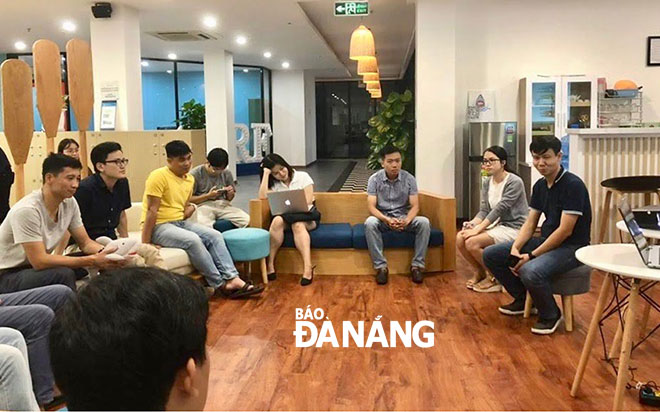Failure makes you a better entrepreneur
Developing start-up projects is very tough as challenges, difficulties, and even repeated failures can become inevitable startup problems. “Therefore, we need to learn how to fail smartly, which means that getting up firmly from a fall”, said Nguyen Quoc Han, the Director of CTNET DIGITAL company during his recent talk with young startups in Da Nang.
 |
| Director of CTNET DIGITAL company Nguyen Quoc Han (1st, right) during his recent talk with young local startups about how to fail smartly |
Two years ago, when CTNET was operating well in the city’s software industry, Han generated an idea of developing a mobile application that connects his customers with those active in the beauty industry.
Learning from similar models successfully used worldwide and conducting surveys into the Vietnamese market, Han held a belief that he could turn his idea into reality and set up a startup group.
Afterwards, Han’s brainchild was posted on Apple's online application store. Unfortunately, the number of app downloads was really much lower than expected whilst the startup team put quite a lot of time, efforts and money into developing this app. “I committed the most fundamental mistake as I lacked the full understanding of the market”, said Han.
Han realised that that failure did not deeply upset such a strong-willed person holding strong passion for startups like him, and he had learnt valuable experience from his failure instead.
He has always kept in his mind that “Failure is the best worst thing you can have, but only if you use it smartly. If your plans fail it means that you need to alter your methods, make some changes, and do it differently”.
Fearlessness of failure, ability to ask questions, international-scale thinking and curiosity are the qualities needed to become a successful entrepreneur. Success consists of going from failure to failure without loss of enthusiasm.
In another example of startup failure, Director of Green System Solutions Co Ltd Nguyen Van Chuong, the founder of the ‘InVietnam’ project, said, “Stumble is part of the journey of pursuing your dream”.
In 2016, Mr Chuong did startup with the ‘InVietnam’ mobile app for use in the tourism industry. This research and development project initially aimed at incubating human resources for the internal use, and helping research lovers apply technology into life, hereby developing new entrepreneurs. However, as ‘InVietnam’ started to moving to the stage of commercialisation, Chuong found it very hard to employ his skilled staff, and that was a reason why the project halted temporarily.
Despite the failure, Chuong has still focused on maintaining the project in terms of technological enhancement.
A lesson was drawn here that he should have been seeking highly qualified employees before the project entered into the commercialisation process.
According to Vu Xuan Truong, the Director of the Director of the Research and Development Centre of the Da Nang Business Incubator, underscored a must-do to spend much time researching on the feasibility of a startup idea.
In addition, it is possible to start market testing on a small scale through building single sites only introducing one product or offering the minimum viable products (MVPs) with just enough features to satisfy early customers.
At the same time, it is necessary to find out which companies once launched similar products, and identify why they failed.
Last, but not least, importance should be attached to developing human resources. A certain startup project at an early stage is in desperate needs of staff members with good qualifications, strengths, and rich experiences in such aspects as design, technology and business.
Also, how to secure the project’s operating capital should be taken into account strictly.




